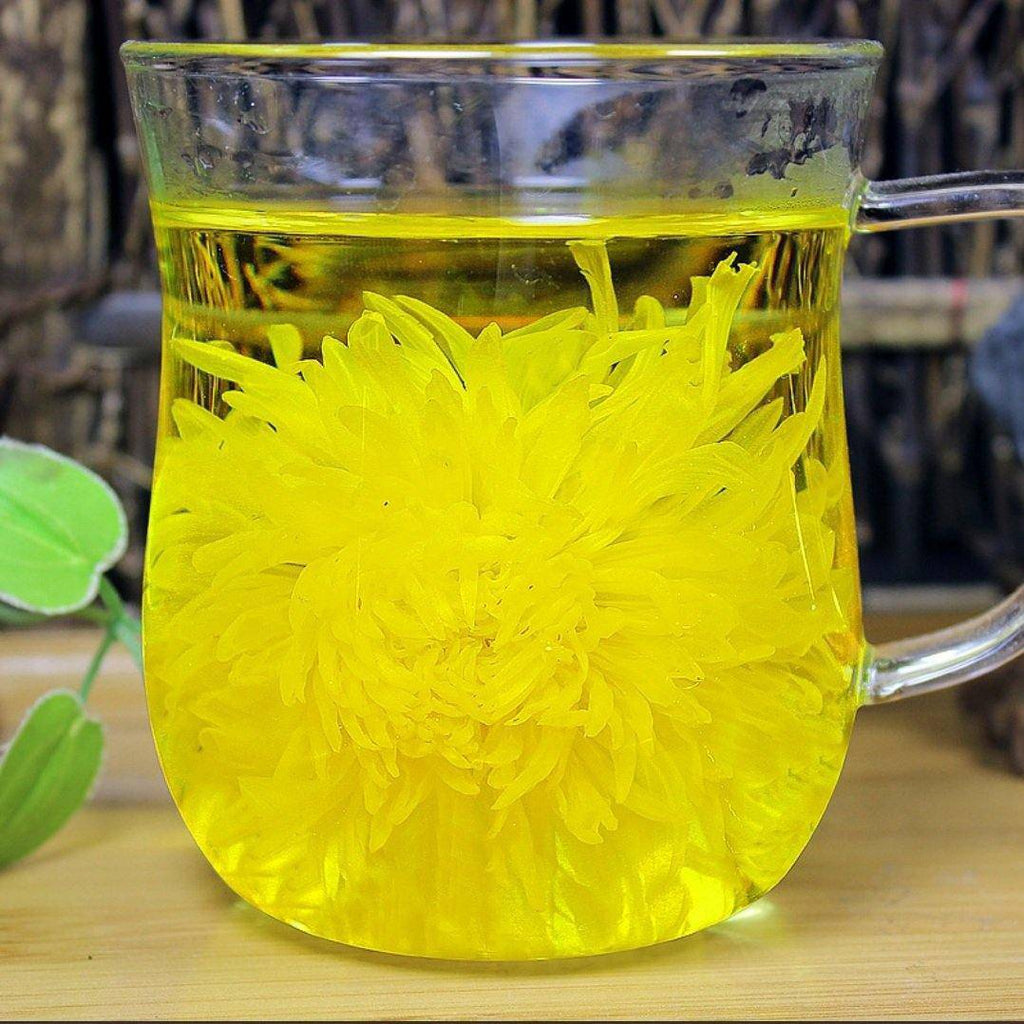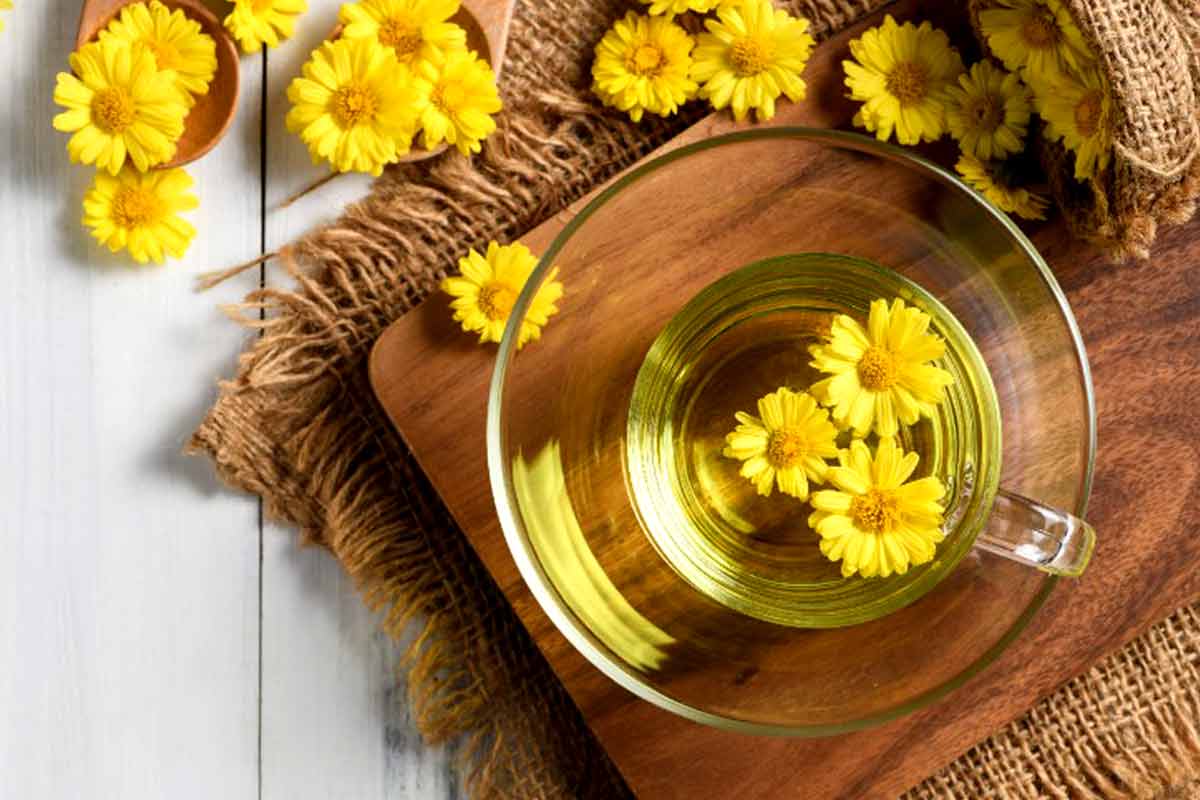What are some of the health benefits of Chrysanthemum tea, its nutrition, recipes, & side effects? Chrysanthemum tea is more than just a delightful beverage. Its nutritional content, rich in antioxidants, vitamins, and minerals, combined with potential health benefits, makes it an excellent addition to a well-rounded diet. However, it is crucial to be aware of potential allergens and to consume them in moderation to fully savor the potential advantages of this remarkable herbal infusion. In this article, we will share some of the health benefits of Chrysanthemum tea, its nutrition, recipes, & side effects. Keep reading.
Chrysanthemum tea’s rich history, delightful taste, and the myriad of health benefits it offers make it a truly remarkable herbal beverage. Whether you seek relaxation, immune support, or relief from common ailments, this floral infusion can be a valuable addition to your daily routine, promoting holistic well-being and a heightened sense of vitality.
Nutritional facts of Chrysanthemum tea
Chrysanthemum tea, a soothing and aromatic herbal infusion, possesses a compelling nutritional profile that has piqued the interest of health-conscious individuals for centuries. This delightful beverage, derived from the dried flowers of the chrysanthemum plant, is revered not only for its delightful taste but also for the array of health benefits it offers. As we delve into its nutritional composition, you’ll discover a treasure trove of vitamins, minerals, and other bioactive compounds that make chrysanthemum tea a worthwhile addition to your daily regimen.
Rich in Antioxidants
One of the most remarkable features of Chrysanthemum tea is its rich antioxidant content. These antioxidants, including flavonoids, quercetin, and chlorogenic acid, play a pivotal role in scavenging harmful free radicals in the body. By doing so, they help mitigate oxidative stress, which is known to contribute to chronic illnesses and premature aging. The presence of these potent antioxidants makes Chrysanthemum tea a valuable ally in maintaining overall health and vitality.
Vitamins and Minerals
Chrysanthemum tea is not just a refreshing beverage; it also offers a modest but noteworthy dose of essential vitamins and minerals. Within a steaming cup, you’ll find traces of vitamins A and C, two renowned antioxidants that bolster the immune system and support healthy skin. Additionally, Chrysanthemum tea contains small amounts of calcium and potassium, vital for bone health and maintaining electrolyte balance within the body. While these quantities may not be overwhelming, they contribute to the tea’s overall appeal as a wholesome drink.
Calorie and Sugar Content
For those conscientious about their calorie intake, Chrysanthemum tea emerges as a favorable choice. It is virtually devoid of calories, making it a guilt-free beverage to enjoy. Furthermore, it contains little to no sugar naturally. This characteristic renders Chrysanthemum tea an excellent alternative to sugar-laden, calorie-dense beverages, helping individuals manage their weight and sugar intake.
Potential Health Benefits
Beyond its nutritional content, Chrysanthemum tea boasts a spectrum of potential health benefits. Some studies suggest that it may help lower blood pressure due to its vasodilatory effects, potentially assisting in cardiovascular health. The tea’s anti-inflammatory properties can also be beneficial for individuals suffering from chronic conditions such as arthritis. Its mild sedative effects may contribute to improved sleep quality and relaxation.
Cautions and Considerations
While Chrysanthemum tea has an array of potential benefits, it’s essential to exercise caution and moderation. Some individuals may be allergic to chrysanthemum flowers, leading to adverse reactions. Additionally, pregnant and nursing women should consult with healthcare professionals before including this herbal tea in their diet. Overconsumption can also lead to potential side effects, such as dizziness or digestive discomfort, underscoring the importance of responsible consumption.
Optimal Daily Chrysanthemum Tea Consumption
The consumption of Chrysanthemum tea, a popular herbal infusion, has been a longstanding tradition in various cultures, particularly in East Asia. With its delicate floral aroma and mild, soothing flavor, this tea has garnered a loyal following not only for its taste but also for its potential health benefits. However, the question of how much Chrysanthemum tea one should drink daily, and the timing of its consumption, often arises. Finding the optimal balance is essential to fully embrace the benefits of this beloved herbal beverage.
Determining the Right Daily Quantity: A Delicate Balance
Chrysanthemum tea, derived from the dried flowers of the Chrysanthemum morifolium plant, is renowned for its natural and therapeutic qualities. When it comes to determining the ideal daily consumption, it’s imperative to consider individual factors such as age, overall health, and personal preferences. Generally, consuming two to three cups of Chrysanthemum tea per day is considered safe for most individuals. This moderate intake provides a balance between enjoying the tea’s flavor and reaping its potential health benefits, which include anti-inflammatory and antioxidant properties.
However, for those who are new to Chrysanthemum tea or have specific health concerns, it’s advisable to start with a single cup per day and gradually increase the intake while monitoring how their body responds. This gradual approach ensures that one’s system can adapt to the tea and that any potential adverse reactions can be minimized.
Timing Matters: When to Savor Chrysanthemum Tea
The timing of Chrysanthemum tea consumption can greatly influence the overall experience and benefits one derives from it. Due to its calming and soothing properties, Chrysanthemum tea is an excellent choice to start your day, providing a serene and balanced beginning. Alternatively, it can be savored during the afternoon to alleviate stress and anxiety, making it a wonderful complement to a busy workday.
In the evening, Chrysanthemum tea can serve as a relaxing prelude to a peaceful night’s rest. Its natural sedative qualities can help ease you into a tranquil state, promoting better sleep quality. However, it’s important to note that while Chrysanthemum tea is generally caffeine-free, some blends or additives may contain caffeine, so it’s wise to opt for caffeine-free varieties in the evening.
A Few Additional Considerations: Tailoring Your Chrysanthemum Tea Routine
Beyond the recommended daily quantity and timing, individual preferences and health objectives should also influence your Chrysanthemum tea routine. Consider your personal taste preferences; some enjoy the tea hot, while others prefer it iced. You can also experiment with honey or lemon for added flavor and health benefits. Moreover, if you have specific health goals, such as managing allergies or promoting digestion, you may choose to incorporate Chrysanthemum tea into your daily routine accordingly.
Health benefits of Chrysanthemum tea
The optimal daily consumption of Chrysanthemum tea is a matter of personal choice, influenced by various factors. The key is to start with a moderate intake, monitor your body’s response, and adjust accordingly. The timing of consumption can also be tailored to your daily needs, from a serene morning start to a restful evening wind-down. Ultimately, Chrysanthemum tea is a versatile and healthful beverage that can be enjoyed in a manner that aligns with your preferences and well-being objectives.
Chrysanthemum tea, derived from the petals of the Chrysanthemum morifolium flower, is a centuries-old herbal infusion renowned for its multifaceted health benefits. Beyond its delightful aroma and soothing taste, this tea offers an array of advantages for those who partake in its consumption. In this comprehensive exploration, we delve into the 14 prominent health benefits that make Chrysanthemum tea a cherished beverage.
Here are some of the health benefits of Chrysanthemum tea:
1. Stress Reduction and Anxiety Alleviation
In the contemporary milieu characterized by relentless and frenetic lifestyles, the prevalence of stress and anxiety has grown to an alarming extent. It is amid this clamor and chaos that the delicate and soothing qualities of Chrysanthemum tea emerge as a veritable elixir for the frayed nerves of individuals grappling with the demands of daily existence. The infusion of this herbal wonder envelops the senses in a symphony of tranquilizing fragrances and warmth, effectively serving as a refuge for the mind from the relentless storm of daily obligations. In the gentle tendrils of steam rising from a cup of Chrysanthemum tea, one can discover an oasis of serenity that whispers to the soul, imploring it to unburden itself of the tumultuous anxieties that beset it. This aromatic beverage, bestowed with nature’s own sedative properties, becomes a sanctuary, where individuals can seek solace and respite, relinquishing the weight of their concerns for a fleeting moment.
2. Improved Sleep Quality
The pursuit of quality slumber is an indispensable facet of holistic well-being, a respite from the rigors of life, and a sanctuary for the rejuvenation of body and mind. Chrysanthemum tea, a venerable elixir celebrated through the annals of time, reveals a remarkable capacity to facilitate the attainment of a serene and undisturbed repose. The tea’s tranquilizing qualities, akin to a lullaby for the soul, embark on a quest to vanquish the relentless specter of insomnia that plagues countless individuals. With each sip, the warmth and serenity of this golden brew envelop the restless mind, coaxing it into a state of peaceful submission, eventually leading it to the tranquil shores of restorative sleep. The result is a morning awakening that unfurls with a sense of rebirth, as individuals arise from their slumber feeling not merely rested, but truly rejuvenated.
3. Immune System Support
In the age-old embrace of the Chrysanthemum flower lies a bounty of antioxidants, the unsung guardians of our body’s defense mechanisms. These benevolent antioxidants, like sentinels in the night, embark on a mission to neutralize the insidious marauders known as free radicals, whose depredations wreak havoc within the body. The outcome of this tireless vigil is a dramatic reduction in oxidative stress, a silent but potent adversary that relentlessly undermines the resilience of the immune system. As the Chrysanthemum tea’s soothing infusion becomes a consistent presence in one’s life, it bestows the gift of a fortified immune response, akin to the reinforcement of a mighty citadel against encroaching foes. It thus becomes a conduit through which the body is empowered to fend off ailments with newfound vigor, its defenses fortified through the medium of nature’s own elixir.
4. Allergy Relief
For those ensnared by the nettlesome grip of allergies, Chrysanthemum tea emerges as an invaluable ally in the battle for respite. It dons the mantle of a natural antihistamine, a role it plays with unparalleled finesse. Histamines, those pesky chemical instigators of allergy symptoms such as incessant sneezing, nasal congestion, and those exasperatingly itchy eyes, are duly silenced in the presence of this herbal hero. The result is a soothing reprieve from the throes of seasonal or environmental allergies, a momentary respite from the vengeful onslaught of allergenic triggers. With a comforting cup of Chrysanthemum tea in hand, the afflicted can bask in the serenity of relief, knowing that they have at their disposal a time-honored antidote to the woes of allergies.
5. Skin Health Enhancement
For those who covet the visage of a radiant and unblemished complexion, Chrysanthemum tea unfolds as a closely guarded secret, a weapon in the arsenal of beauty and self-care. Nestled within its fragrant depths reside a legion of antioxidants, warriors against the marauding free radicals that assail the skin. These diminutive champions, armed with the power of nature, wage a ceaseless battle against the forces of aging and skin degradation.
Through their concerted efforts, they not only promote a youthful and supple appearance but also help to preserve the skin’s inherent elasticity, a true fountain of youth bestowed by the gift of Chrysanthemum tea. Its repertoire of attributes doesn’t end there, for it also possesses anti-inflammatory properties that serve as a balm for skin irritations and redness, offering a holistic approach to enhancing one’s overall skin health and well-being. In the graceful unfurling of every Chrysanthemum-infused leaf, individuals discover the potential for a more radiant and harmonious relationship with their skin, a testament to the power of nature’s embrace.
6. Alleviating Digestive Discomfort
Digestive issues can frequently plague individuals, causing discomfort and inconvenience. Chrysanthemum tea, a soothing elixir with a delightful floral essence, offers a helping hand in the realm of gastrointestinal wellness. It possesses the remarkable ability to ameliorate a host of common complaints, including indigestion, troublesome bloating, pesky gas, and those bothersome stomach cramps that tend to interrupt the flow of your day. The gentle, mild flavor of this tea is like a comforting embrace for an upset stomach, coaxing it back to a state of serenity.
7. Aiding in Blood Pressure Control
One of the most pressing health concerns of our time is the issue of high blood pressure, a silent but insidious threat to cardiovascular well-being. Chrysanthemum tea, with its potassium-rich profile, emerges as a potential natural panacea in the battle for blood pressure regulation. Potassium, a vital mineral, functions as a counterbalance to the effects of sodium, thereby helping to maintain a harmonious equilibrium within your circulatory system. Regular indulgence in this tea might very well be the step toward nurturing a healthier cardiovascular landscape.
8. The Guardian of Cholesterol Health
Maintaining healthy cholesterol levels is a cornerstone of cardiovascular well-being. Enter Chrysanthemum tea, an unexpected hero in the quest for cholesterol management. It boasts a generous serving of antioxidants, which act as vigilant guards against the pernicious oxidation of low-density lipoprotein (LDL) cholesterol. This steadfast defense serves to diminish the peril of atherosclerosis and related heart issues, safeguarding your cardiovascular health with each comforting sip.
9. A Companion in Weight Management
For individuals embarking on the journey of weight management, Chrysanthemum tea is a trustworthy companion, offering a precious asset to their daily routine. Remarkably, this infusion is a calorie-free elixir that exerts a tangible influence on your appetite. It artfully curbs the cravings for those seductive, high-calorie, and sugar-laden beverages that can sabotage your weight loss goals. Thus, it becomes an indispensable choice for those ardently pursuing the reduction of excess pounds, lending a helping hand in their pursuit of a healthier, more svelte physique.
10. Respiratory Respite
When battling the relentless discomfort of cold or respiratory ailments, Chrysanthemum tea emerges as a soothing balm, tenderly alleviating your discomfort. This remarkable infusion, endowed with anti-inflammatory properties, serves as a trusted ally in your quest for relief. It has the uncanny ability to offer solace to sore throats, assuage nagging coughs, and disentangle the webs of congestion that often accompany respiratory distress. It stands as a stalwart remedy, particularly cherished during the frigid winter months, when the chill in the air can bring unwelcome ailments, offering a beacon of respite for those seeking refuge from the wintertime woes.
11. Eye Health Enhancement
In our modern era, characterized by a pervasive reliance on screens and digital devices, safeguarding the well-being of our eyes emerges as an endeavor of paramount importance. Chrysanthemum tea, a beverage brimming with a plethora of essential vitamins and minerals, emerges as a veritable elixir for nurturing and preserving ocular health. This cherished infusion, culled from the delicate petals of the chrysanthemum flower, assumes a significant role in the realm of preventive healthcare by bestowing an array of optical benefits. Among its manifold virtues, the tea possesses the capacity to diminish the likelihood of encountering debilitating conditions such as age-related macular degeneration and cataracts.
12. Anti-Inflammatory Properties
In the intricate tapestry of human physiology, inflammation serves as the ominous harbinger of numerous chronic ailments, lurking at the epicenter of afflictions that afflict countless individuals. Amid this pernicious backdrop, the eminently soothing and health-bestowing attributes of Chrysanthemum tea unfurl like a botanical panacea. Hidden within its fragrant infusion are compounds endowed with the remarkable ability to quell the flames of inflammation that rage within our bodies. By orchestrating a symphony of anti-inflammatory forces, this venerable tea stands poised to champion the cause of overall wellness. This noble crusade may play a pivotal role in mitigating conditions such as arthritis and heart disease, effectively shielding us from the relentless onslaught of these maladies.

13. Liver Detoxification
Nestled within the confines of our corporeal temple, the liver stands as the undisputed sentinel of detoxification, a sentinel tirelessly toiling in the unending pursuit of ridding the body of noxious substances and waste materials. In this ceaseless endeavor, the venerable Chrysanthemum tea dons the mantle of a loyal ally to our hepatic guardian. This liquid ambrosia harbors a treasure trove of compounds, each diligently contributing to the noble cause of liver health. With meticulous care, Chrysanthemum tea facilitates the elimination of toxins, ushering them towards their final exodus from our mortal vessel. In doing so, it paves the way for a healthier, toxin-free existence, a true testament to the tea’s intrinsic medicinal power.
14. Antimicrobial Effects
In the annals of traditional medicine, there exists a hallowed elixir with the power to ward off menacing infections, a bulwark against the relentless siege of pathogens. This fabled remedy is none other than Chrysanthemum tea, an infusion steeped in history and brimming with antimicrobial prowess. Its ancient reputation as a formidable guardian against the common cold and flu finds substantiation in modern scientific understanding. Within the gentle embrace of Chrysanthemum tea’s essence lie the potent constituents that stymie the proliferation of diverse pathogenic microorganisms. Thus, this botanical marvel serves as a valuable addition to one’s health regimen, offering protection against the invisible armies of disease-causing invaders.
Chrysanthemum tea recipes
Chrysanthemum tea, a quintessentially soothing infusion, is a floral elixir brimming with not only a captivating aroma but also numerous health benefits. This delicate brew is prepared by steeping dried chrysanthemum flowers in hot water, releasing a fragrance reminiscent of fresh blossoms in a sun-drenched garden. As the flowers gently unfurl in the hot water, they impart a golden hue to the brew, a visual feast that tantalizes the senses. Beyond its aesthetic appeal, chrysanthemum tea is celebrated for its therapeutic qualities, believed to alleviate stress, ease headaches, and boost the immune system. Its rich history traces back to ancient China, where it was cherished as both a medicinal remedy and a fragrant beverage, making it a timeless classic in the world of herbal teas.
Ingredients
To craft a refreshing batch of chrysanthemum tea, you’ll need the following key ingredients:
Dried Chrysanthemum Flowers: The star of the show, these delicate, dried blossoms carry the essence of the tea.
Water: Purified water, preferably free from impurities, is vital for ensuring a pristine infusion.
Sweetener (optional): If you prefer your tea on the sweeter side, you can add honey, rock sugar, or your sweetener of choice.
Proportions
Achieving the perfect balance in your chrysanthemum tea is crucial to ensure a harmonious brew. For a single serving, a ratio of 4-6 dried chrysanthemum flowers per 8 ounces (240ml) of water is a popular choice. Adjust this ratio to suit your personal taste; more flowers yield a stronger flavor and aroma.
Steps
Crafting a delightful cup of chrysanthemum tea is a straightforward yet delightful process, as follows:
Boiling Water: Begin by boiling water to the desired quantity. The water temperature should be around 200°F (93°C) for optimal infusion.
Rinsing Flowers: Place the dried chrysanthemum flowers in a tea strainer or teapot.
Pouring Water: Pour the freshly boiled water over the flowers, ensuring they are fully submerged.
Steeping Time: Allow the flowers to steep for approximately 5-7 minutes, during which they will gradually unfurl, releasing their captivating aroma.
Optional Sweetening: If desired, add your preferred sweetener while the tea is still hot and stir to dissolve.
Savoring the Elixir: Finally, pour your chrysanthemum tea into a cup or glass, inhale the enchanting fragrance, and take a sip of this delightful brew. It can be enjoyed hot or allowed to cool for a refreshing iced version.
With its enchanting fragrance and ease of preparation, chrysanthemum tea is a timeless herbal infusion that not only appeals to the senses but also offers a myriad of health benefits. Whether you’re seeking a moment of relaxation or a fragrant journey into the world of botanical teas, this floral elixir is sure to captivate your taste buds and invigorate your spirit. So, why not embark on this delightful tea-making journey and savor the soothing essence of chrysanthemum in a cup? Motivation – Mind – Success – Thinking – Productivity – Happiness
Side effects of Chrysanthemum tea
Chrysanthemum tea, derived from the dried flowers of the Chrysanthemum morifolium plant, is a popular herbal infusion celebrated for its delicate floral aroma and purported health benefits. However, like many herbal remedies, chrysanthemum tea is not devoid of side effects. In this comprehensive exploration, we shall delve into the multifaceted world of chrysanthemum tea, uncovering its potential side effects and providing a nuanced understanding of the beverage’s impact on human health.
Digestive Disturbances
One of the most commonly reported side effects associated with chrysanthemum tea consumption is digestive disturbances. These may manifest as mild symptoms such as abdominal discomfort, flatulence, or bloating. The floral infusion, with its rich compounds, may not always agree with sensitive stomachs, leading to transient gastrointestinal discomfort. It is essential for individuals with a history of digestive issues to exercise caution when introducing chrysanthemum tea into their daily routine.
Allergic Reactions
Chrysanthemum tea contains a diverse array of phytochemicals, which, in rare cases, can provoke allergic reactions. These reactions may range from mild skin irritations to severe anaphylaxis, a life-threatening condition. Individuals with pre-existing allergies, especially those sensitive to pollen or related botanicals, should be particularly vigilant. It is prudent for such individuals to consult with a healthcare professional before savoring this floral elixir.
Pregnancy and Nursing
Expectant and nursing mothers should also exercise caution when considering the consumption of chrysanthemum tea. This herbal infusion contains compounds that might affect hormonal balance, potentially impacting pregnancy or lactation. There is limited scientific research on the effects of chrysanthemum tea during pregnancy, and therefore, prudence is advised, with consultation with a healthcare provider being the best course of action.
Liver Health
Chrysanthemum tea has been scrutinized for its potential impact on liver health. While moderate consumption is typically considered safe for most individuals, excessive intake could exert undue stress on the liver. The liver is responsible for metabolizing various compounds, and overconsumption of chrysanthemum tea may challenge its detoxification abilities. Individuals with pre-existing liver conditions should heed this concern and consume chrysanthemum tea judiciously, if at all.
Interactions with Medications
Another facet to consider is the potential interactions between chrysanthemum tea and medications. Some compounds in the tea may interfere with the absorption or metabolism of certain drugs, potentially reducing their efficacy or causing adverse effects. Individuals taking prescription medications, particularly those with narrow therapeutic windows, should discuss the consumption of chrysanthemum tea with their healthcare provider to ensure it won’t compromise their treatment. Tea, Coffee, Energy Drinks, Juice, Beverage, Smoothie, and more
Sensitivity to Asteraceae Plants
Chrysanthemum tea belongs to the Asteraceae family, a group of plants that includes ragweed, marigolds, and daisies. Individuals with known sensitivities to Asteraceae plants may experience cross-reactivity when consuming chrysanthemum tea. This could manifest as allergic symptoms, including itching, sneezing, or skin rashes. It’s vital for those with known sensitivities to approach chrysanthemum tea with caution.
Final thought
Chrysanthemum tea, celebrated for its exquisite flavor and potential health benefits, is not devoid of side effects. Digestive discomfort, allergic reactions, and concerns related to pregnancy, liver health, and medication interactions underscore the importance of mindful consumption. While many individuals can enjoy this floral elixir without issue, it is crucial to be aware of these potential side effects, and when in doubt, seek guidance from a healthcare professional. Balancing the pleasure of sipping chrysanthemum tea with a discerning approach to personal health is key to a positive experience with this beloved herbal infusion.



